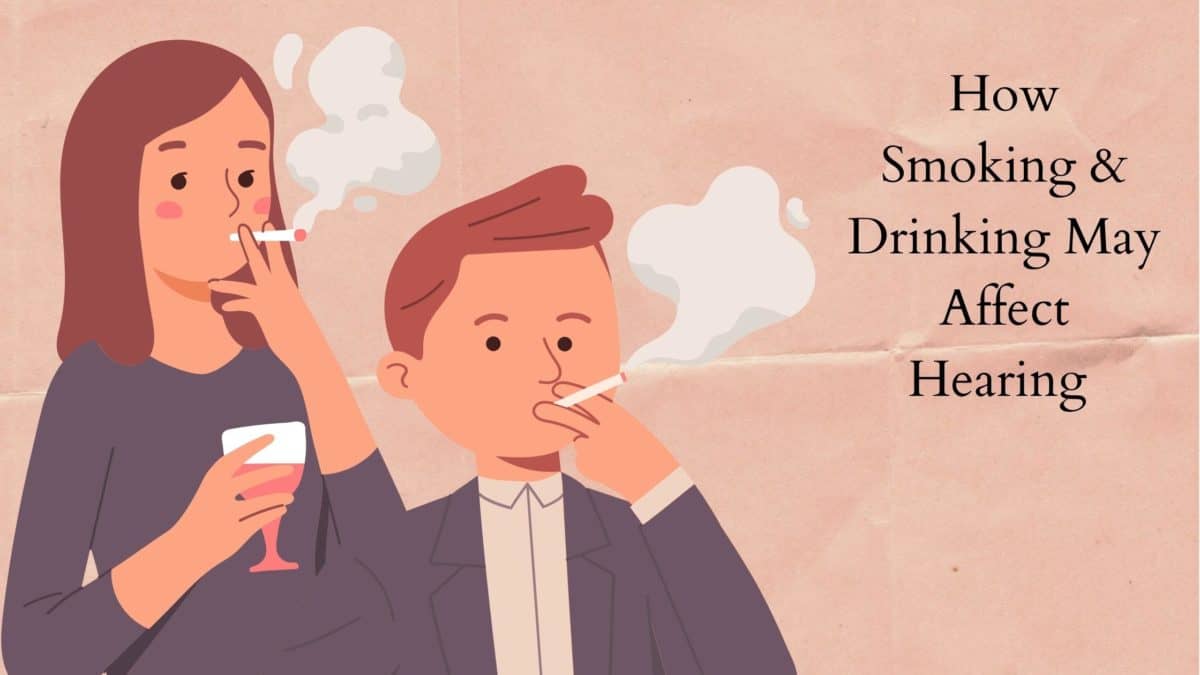- Understanding the Impact of Noise Pollution on Hearing Health - June 4, 2025
- Can Swimming With Hearing Aids Be Safe? - May 7, 2025
- Why Hydration Matters for Hearing Health - April 9, 2025
Most people are aware of the common health risks associated with smoking and drinking – increased risk of developing conditions like cancer, heart disease, high blood pressure, etc. But we tend to be less aware of other health issues these behaviors can contribute to. This includes hearing loss, the third most pervasive medical condition people navigate today. Various studies show that smoking and drinking can contribute to impaired hearing. The good news is that patterns related to smoking and drinking can change which can reduce the risk of developing hearing loss.
Link Between Smoking, Drinking, & Hearing Loss
Numerous studies explore the relationship between smoking, drinking, and hearing loss. Research has established a correlation between hearing loss and these substances. This includes the following recent studies:
- A study published in the American Journal of Medicine: researchers analyzed data that spanned 22 years for 81,505 people. During this study, 2,760 people developed hearing loss and after evaluating smoking habits, researchers found that:
- Compared to nonsmokers, smokers were 60% more likely to develop high-frequency hearing loss
- people who quit smoking (up to 10 years prior) still experienced a higher risk of experiencing hearing loss
- A study published in the Nicotine & Tobacco Research Journal: this study included nearly 50,000 people, ages 20-64. Researchers evaluated and collected data for 8 years and participants did not have hearing loss at the beginning of the study. Participants had their hearing abilities and smoking habits evaluated. Key findings include that compared to nonsmokers, people who currently smoked were:
- 60% more likely to develop high-frequency hearing loss
- 20% more likely to develop low-frequency hearing loss
Also, researchers found that higher amounts of smoking were associated with an increased risk of hearing loss. People who smoked:
- Up to 10 cigarettes per day were 40% more likely to develop high-frequency hearing loss and 10% more likely to develop low-frequency hearing loss.
- 11-20 cigarettes per day were 60% more likely to develop high-frequency hearing loss and 20% more likely to develop low-frequency hearing loss.
- 20+ cigarettes per day were 70% more likely to develop high-frequency hearing loss and 40% more likely to develop low-frequency hearing loss.
These studies highlight a significant correlation between smoking and hearing loss.Not only can smoking increase the risk substantially, but the amount one smoke’s can also further increase this risk. In addition to studies on smoking and hearing loss, research also shows that alcohol can contribute to impaired hearing. This includes:
- A study by researchers at the University of Ulm (Germany): To study the cumulative effect of alcohol consumption researchers measured brainstem auditory evoked potentials (BAEPs) which assess the auditory pathways among participants with varying levels of alcohol use. After evaluating BAEP data, researchers found that alcohol consumption can lead to damage to the central auditory cortex. This results in the increased time needed to process sound, contributing to hearing loss over time.
How Smoking & Drinking Impacts Hearing Health
Researchers suggest that there are a few ways that smoking and drinking can contribute to hearing loss. This includes:
- Impacts blood flow: nicotine, the primary ingredient in cigarettes, restricts blood vessels. This affects blood flow throughout the body including the inner ear which is integral to processing sound.
- Increases blood pressure: blood pressure and heart rate can also increase as a result of smoking and drinking. This can constrict arteries which increases the risk of heart attacks, blood clots, and strokes. The blood vessels in the inner ear can also be impacted, causing hearing loss.
- Nerve damage: smoking and drinking can also affect the nerves and neural pathways. It can prevent neurotransmitters from sending auditory information from the ears to the brain which can lead to hearing challenges.
The most effective way to prevent these outcomes is by eliminating or reducing the consumption of alcohol as well as smoking.
Tips to Protect Hearing Health
Practicing ways to protect your hearing health can reduce your risk of experiencing impairment. This is especially important for people who engage in smoking and drinking. A few tips include:
- Eliminate or reduce consumption. As studies show, the more alcohol and nicotine that is consumed, the greater the health risks are. So reducing consumption or even eliminating this can prevent the development of hearing loss.
- Have hearing tests regularly. Assessing your hearing capacities in both ears is a great way to stay on top of your hearing needs and to track any changes you may experience.
Call us today to schedule an appointment for a hearing consultation. This is the first step in prioritizing our hearing health!

